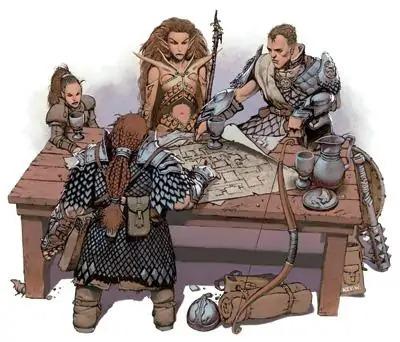So you and your group are on your way to clear out a fortress that has been abandoned for a long time and is deep in a remote mountain range. On your way, a Verdan who looks sketchy and has green skin and sharp teeth comes up to you.
No one in your group can understand the Goblin language, even though they talk with a lot of emotion and use their hands to show how they feel.
It would be great if you could understand what they were saying about the mind flyer who lives in the fortress you are about to explore, but the Dungeon Master laughs and sends you on your way.
In situations like this, the Comprehend Languages spell can really shine. This is a guide for Comprehend Languages 5e.
Summery
During that time, you can understand the exact meaning of any language you hear spoken. You can also read any written language, but you have to touch the surface where the words are written.
One page of text takes about a minute to read. This spell can’t figure out hidden messages in a text or glyph, like an arcane sigil, that isn’t part of a written language.
What is Comprehend Languages?

This first-level Divination spell can be found on page 224 of the Player’s Handbook (or PHB). Divination spells give people a clearer picture of what happened in the past, what is happening now, or what will happen in the future.
The spell itself lets the person who casts it understand the literal meaning of spoken or written language.
With this spell, it takes one minute to read one page of text or the equivalent (at the Dungeon Master’s or DM’s discretion). The spell itself lasts for one hour, unless something like Extend Magic changes it.
For the spell to keep working for its full hour, the person who casts it has to keep concentrating on it. That means they can’t cast any other spells that require concentration while this is going on.
It also means that you have to make a dice check if you take damage (or a DC). For concentration spells, you need to roll your 20-sided die (D20) plus your constitution modifier to see if you can focus on the pain you just got.
All concentration spells need a roll of 10 or more, or half the damage done, rounded down to the nearest whole number (if the damage done is more than 10).
Also, if you take damage from more than one place, you need to make more than one saving throw to see if you can keep the spell going. Lastly, if you lose your ability to move, like if you are put to sleep or stunned, the spell will no longer work.
So, what good does this do you? Like in our example above, a wizard who could cast “Comprehend Languages” could translate what the Verdan said from Goblin to Common as it was being said.
This means you could understand what the Verdan said earlier. Since the spell lasts for an hour, you could also understand any other language being spoken around you as long as the spell was still working.
So if someone spoke Draconic and someone else spoke Elvish, and your spell was over, you would be able to understand them both.
What Comprehend Languages is not

Comprehend Languages is not able to do everything. It’s not a reason to know everything all the time. The PHB says that Comprehend Languages can’t figure out how to decode encoded texts.
For example, if a cult you are following wrote their orders in Infernal but used a cypher to hide what they were saying from people who wanted to read them. Comprehend Languages wouldn’t be able to read the text right away; instead, it would be Infernal, which means “not understandable.”
According to the PHB, Comprehend Languages doesn’t let you read symbols, glyphs, or runes. The PHB doesn’t say anything about pictographs, but based on the DM’s digression, they could also be in this group.
So, for example, you might find a Gnomish text in which people’s names are written as circles with lines through them or squiggles. The names of these people would not be given to you by Comprehend Languages.
The PHB also says that you know what is being said in its literal sense. I think this means that the DM doesn’t have to tell you exactly what they mean, but has a lot of room to play with.
Anyone who has learned more than one language knows that the way sentences, words, and meanings are put together in different languages is very different.
Idioms are often hard for people who don’t speak a language as their first language to understand. For example, my mother often says in Spanish, “you are going to the theatre of the white sheets,” which means the same thing in English.
The person isn’t going to a movie theatre full of white sheets, which is what the phrase literally means. Instead, it means the theatre of dreams when you’re tired.
People think that the phrase means “they fell asleep,” but that’s not what it means. This is an example of how people who speak a language as their first language use common and sometimes made-up phrases to say what they mean more clearly.
In the same way, a smart DM could use phrases that you wouldn’t understand but that would make sense to people who speak that language naturally. The same goes for idioms that don’t mean what they say literally, like “he’s not the brightest bulb in the box,” which means that someone isn’t very smart.
So, even with the rules for Comprehend Languages in place, the DM has a lot of room to make the translated text clear or confusing.
Most people don’t understand that Comprehend Languages doesn’t teach you how to speak or write in the language that is being spoken. Comprehend Languages is not the same as knowing a language well.
If you know how to speak and write a language well, you can also communicate with people who speak that language. This makes it more useful.
It doesn’t mean that Comprehend Languages is bad, but it balances it out and makes it more important and meaningful to take languages as part of your build.
Also, you might have guessed by now that Comprehend Languages doesn’t give you the ability to talk to animals. That’s a different spell called Speak with Animals, which fits the purpose.
In this fantasy world, animals can talk to other animals of their own species or even to animals of other species that this spell can’t reach (unless you can convince your DM otherwise.)
The last thing that can’t be done with Comprehend Languages is more of a reminder of what I’ve already said: it’s up to the DM. If the DM wants to keep something from you, that is their right.
If they want to give you a break and let you read a set of runes even though the PHB says you can’t, they can. Just work with the DM and remember that there are no rules that the DM can’t bend.
Who can Cast Comprehend Languages?
The limits on PHB Give the Comprehend Languages skill to the Bard, Sorcerer, Warlock, and Wizard classes. Based on the D&D lore, these characters can use different ways to channel arcane energies and cast spells.
Since this is a real magic spell, it makes sense from the story that only these classes can use it. Comprehend Languages can’t be used by other types of magic users, like Artificers or Blood Magic users, because it is a different type of magic.
Comprehend Languages could be used in some creative ways by people who don’t cast spells. With the Comprehend Languages spell, items like rings can be made so that the person who wears them can use the spell (usually for a limited amount of time per day or long rest.)
There may also be potions, scrolls, wands, or even home-made ways for a character who isn’t a spellcaster or a spellcaster who doesn’t have this great utility spell to use it.
How Players Can Use Comprehend Languages

Based on how your class works, you can learn and prepare one of these spells. Before you can cast a spell, you have to get it ready ahead of time, unless your character has a rule that lets them ignore that rule. After that, you can use it like you would use any other spell in your class.
For Comprehend Languages to be cast, it needs a verbal part, a somatic part, and a material part. The PHB makes it clear that the material parts are a pinch of soot and salt. The verbal and physical parts of the game are up to the player.
I like to think about my character and make the verbal and physical parts fit how my character would act.
For example, if I’m playing a College of Lore Bard, I might make the verbal component a call to tell me a story and the somatic component very specific gestures that I use to bring the storytellers into my circle.
I think it’s much more fun to play as a spellcaster if you take the time to make spells fit with the look or story of your character.
A few tips on how to be a good caster. Write down or make a mental note of when you cast the spell or what was going on so you can remember.
You are responsible for keeping track of how long your spell has been up in game time. If you are not in combat and your group is doing a lot of things, you might have to ask the DM how long it has been since you used Comprehend Languages.
You might also want to write down that you have Comprehend Languages turned on. If you forget and cast another concentration spell or miss something important that was said in a different language, that’s on you.
How DMs Can Use Comprehend Languages

Let’s be honest: the DM always knows everything, right? That doesn’t mean that you can’t use Comprehend Languages in your plans or games.
There are many creative things you could do to make your world feel more real or change the difficulty for your players.
If a player has the Comprehend Languages ability, one of the hardest things for a DM to do is to keep certain information from them. This could be done in many different ways, depending on the situation.
Putting some or all of something important in code is my favourite thing to do. It doesn’t even have to be a cypher (unless you want it to be.) Cryptography was used as far back as ancient Egypt and Mesopotamia, which is not a fantasy world (circa 1900 and 1500 BCE respectively.)
It would make sense for a secret group of assassins or cultists to have cyphers or secret symbols that no one outside of that group could understand.
My advice is to make it seem real and natural in the setting you’ve made, so it fits right in with the world the players are in.
On the other hand, a smart DM could leave information in a different language that is not coded to mess with their players.
If you didn’t want to say the obvious information drop or wanted to give the group of Lizardfolk highwaymen a little more flavour, you could have them talk in Draconic and see if your players catch on.
It might be strange if the same group wrote all of their messages in Common just so that the players could read them later.
Also, keep in mind that your NPCs may already know Comprehend Languages because it’s part of how they were made or because they use it every day. If the players try to hide their plans by talking in a language your NPC wouldn’t understand, you might try to cast Comprehend Languages and see if they notice.
Lastly, keep in mind that when you give your players the translated version of a conversation or text, it doesn’t have to be in the grammar or syntax they would normally use.
You could make it harder for your players by using an object, a verb, and then a subject, like in Japanese, instead of the usual subject, verb, and object in English.
Try different things with it and make it as hard or easy as you think they need in each situation.
Making Comprehend Languages Fun and Immersive

I can’t say enough about how important flavour is to spells. Don’t be afraid to think outside the box when casting Comprehend Languages.
You might also want to think about how it looks when the spell is being cast and how it looks after it has been cast, since the spell only lasts an hour.
As a visual part of the spell, you could give your character runes all over their body that light up when someone speaks a different language. Have fun with it.
Be a good player in a group of other players as well as thinking about flavour. Everyone wants to have fun and have a chance for their character to shine.
I’ve always thought that if a character can speak Sylvan naturally as part of their build, they should be the one to listen in on that Half-Elf thief.
If no one else in the group speaks Sylvan, Comprehend Languages can shine and my character can take the spotlight for a moment.
Maybe your character with the Comprehend Languages skill tells you what the words mean in their literal sense, but the character who speaks Sylvan as their native language knows what is being said much better than you do.
So, try to work with the other people at your table to find out what languages they know. This will help you know when you should let them take the lead and when you should step in.
You could also work with one of the other players to add a little flavour. Maybe they learned some Sylvan when they were young, but they don’t know every word in the language’s large vocabulary.
If you use Comprehend Languages with your character casting, you might be able to better understand what is being said and have better conversations with the character you want to talk to.
Build Ideas: Bards

College of Eloquence
The College of Eloquence teaches Bards how to use their words to make people do what they want. At level six, Bards from the College of Eloquence get the ability “Universal Speech,” which lets them communicate with any creature.
It doesn’t say anywhere in the text that you can understand them. So, when combined with Comprehend Languages, the same Bard would be able to talk to and understand any creature, as long as the conditions for both spells were met.
College of Spirits Bard
Comprehend Languages could spice up your Bard’s conversations with the dead. It would also let them get around some tricks the DM might throw at them, like if the spirit you are trying to talk to only speaks a dead language or only knows Dwarf and nothing else.
College of Whispers Bard
The College of Whispers has the feel of rumours, tricks, and intrigue. I can see how your Whispers Bard, who can listen in on conversations, could use Comprehend Languages.
Sorcerers

Sorcerer with Extended Spell Meta-Magic
As a Sorcerer, you can choose a metamagic ability that makes spells last twice as long. This would make it possible to understand a language for two hours longer.
This use may be rare, but it could be useful if your characters are at a fancy ball in a different country.
Sorcerer with Subtle Spell
Sorcerers can also learn how to cast a spell without using their words or bodies. This could make Comprehend Languages less obvious and make it easier to listen in on people.
It could make a difference if you are captured by an enemy and want to know what they are saying or if you overhear the plans of a group of bad guys you are trying to stop.
Warlocks

Flavor
Warlocks try to learn things that aren’t supposed to be known. It seems like a warlock would be able to do their job better if they could understand different languages.
Even though it’s mostly for your warlock’s flavour, it could be useful if they often deal with people who want to learn about forbidden knowledge or those who protect it.
As part of how their class works and how it feels, warlocks also get a patron. I think they would take a language proficiency test in a language that their customers spoke.
But with Comprehend Languages, you don’t have to do that. It could also be useful if the customer speaks more than one language and the player only knows a few languages.
Warlocks with Eyes of the Rune Keeper
With Eyes of the Rune Keeper, your warlock can understand glyphs, symbols, and written text. This is different from Comprehend Languages, which lets you understand spoken language but not read glyphs or runes.
Adding Eyes of the Rune Keeper to Comprehend Languages makes Comprehend Languages even more useful and gives your character access to even more information sources.
Warlocks with Mask of Many Faces
With Mask of Many Faces, your character can put on the face of another race. It doesn’t say that you know the language that character or race usually speaks.
I would think that you could still speak and understand the languages you used to. But if you also had the Comprehend Languages skill, your now-disguised character would at least be able to understand languages that the character they were pretending to be should know.
It could mean the difference between keeping a lie going or having it fall apart at the wrong time.
Warlocks with Sculptor of Flesh
With Sculptor of the Flesh, your Warlock can change into a different creature. Most of the time, you take on the traits and abilities of the creature you changed into.
But a smart DM could say that your brain hasn’t changed, so you won’t be able to understand languages that the polymorphic target usually speaks.
As with Mask of Many Faces, knowing the languages of a polymorphic target might be an important part of the disguise or be necessary in some situations.
Warlocks with Whispers of the Grave
Warlocks can use Whispers of the Grave to ask up to five questions of the dead. The spell text doesn’t say that you understand them or that they speak your language.
Your DM could throw you a curveball by telling you that your character only speaks an old language. Don’t worry, you can use the spell Comprehend Language to at least figure out what they’re saying.
Warlocks with Pact of the Tome
A Pact of the Tome Warlocks is all about the forbidden knowledge in their spell tome. It makes sense that they could benefit from being able to at least understand languages like Deep Speech, Infernal, Draconic, etc., in which the knowledge might be written.
Wizards

Flavor
Wizards and Warlocks both try to learn as much as they can, but about different things. Some of them like to read, while others like to go on adventures, but they all want to learn more about magic.
A seeker of such knowledge might find it very important to be able to understand almost any book or conversation. It could also be a way for your character to show how smart he or she is by explaining anything to the rest of the group.
Order of Scribes Wizards
Order of Scribes Wizards, like all Wizards, want to learn about magical things. Order of Scribes Wizards, on the other hand, takes the desire to learn one step further.
They actively try to write down as much secret knowledge as they can. It would make sense for them to be able to use Comprehend Languages to understand almost any kind of knowledge they came across, and it would also be useful.
FAQs
Does Comprehend Languages Decode Thieves’ Cant?
Most of the time, no. Thieves’ Cant is a type of coded language that only Rogues can understand. Since it is somewhat coded, cryptic, and uses specialised words, it is thought to be encoded and, therefore, gibberish to someone using Comprehend Languages.
I see it as a kind of public cypher cryptography, where all the information is in front of you but you need a key to figure out which words are important. That is, unless the DM doesn’t agree and says it’s a language and can be understood. Again, it’s all up to the DM.
Can You Use Comprehend Languages on Someone Else?
No, the PHB says that the range for Comprehend Language is “Self.” This means you can only use it on yourself, unlike a touch spell, which you can use on other people by touching them.
Does Comprehend Languages Work on Deep Speech?
Yes, for sure. Wizards of the Coast says that Deep Speech is a language, so it can be used with Comprehend Languages. I usually follow the rule that it’s fair game if Wizards recognise it as a language.
Does Comprehend Languages Work on Marquesian?
I see no reason why not. Mathew Mercer, who was the DM for the show Critical Role, made up the language Marquesian. It’s a well-known language with a standard dialect that people in a certain area can understand, so I think it fits the definition of a language.
Mercer let his players use Comprehend Languages to understand Marquesian in the Critical Role multiverse. So, if the people in your setting or your DM speak Marquisian, I think it’s a good idea to use Comprehend Languages.









